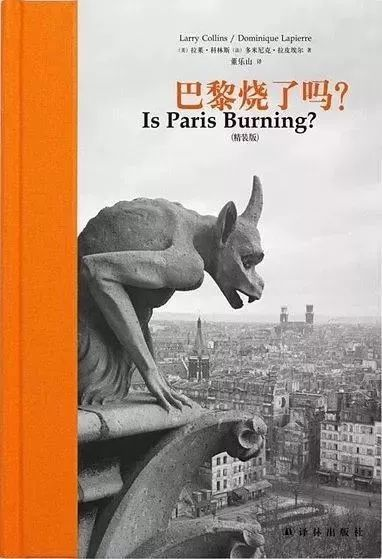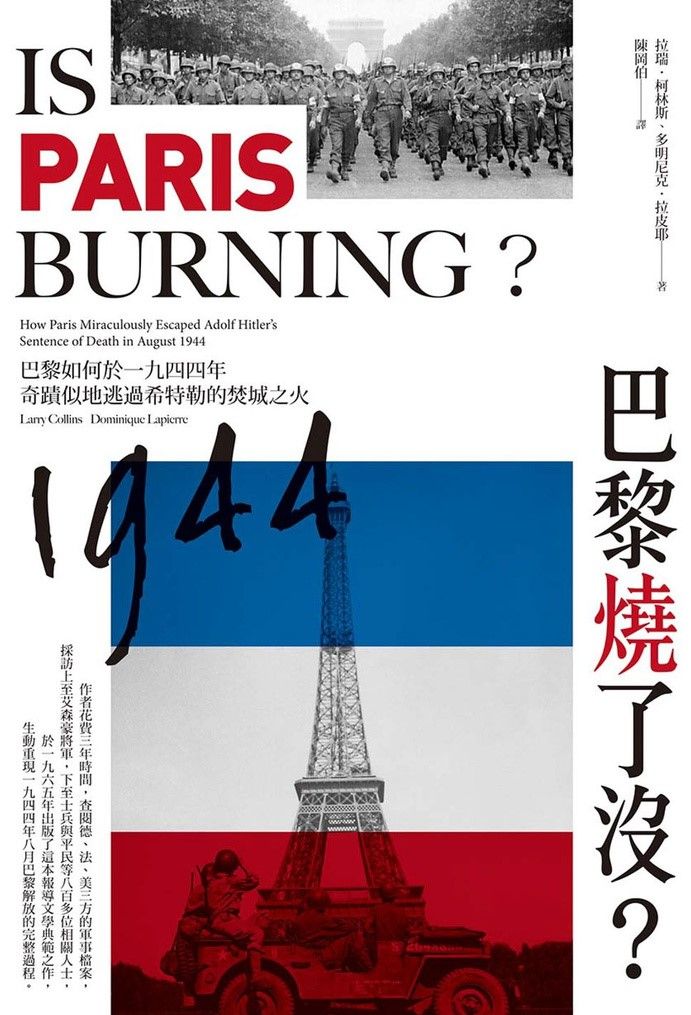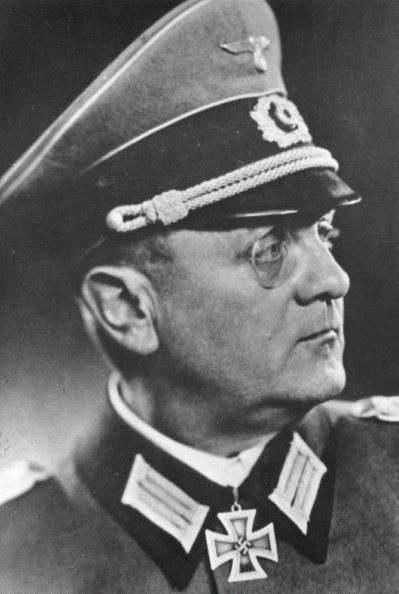[Reading] Larry Collins, Dominique Lapierre, Is Paris Burning? 》

I have the simplified version from Yilin Press, with a funny gargoyle of Notre Dame on the cover.
There is also a traditional Chinese version in Taiwan, with one word missing. The title of the book is "Has Paris Burned?" " .

Regarding this book, I personally strongly recommend purchasing the e-book.
First of all, it has more than 400 pages, which is full of thickness and takes up more space. Second, it's fun! You'll probably want to keep reading, and the weight of those 400+ pages will probably make your hands sore. However, if you want to strengthen your brain and muscles at the same time, you can consider buying a physical book.
Also, there are a lot of names in the book. The author will not focus on the same person in the same place, but will alternately show the situation of different people as the event progresses. However, a German name like "Heinrich" can be very marketable, and I've seen it several times in books.
Therefore, while reading, you may keep seeing "Heinrich" with similar faces, and you may not know who is who. At this time, the search function of e-books can come in handy, so that you can continue to chase dramas without forgetting!
Conclusion first: super fun! You must not imagine that a historical documentary work can be written so witty!
After I read it, it was a must-have for everyone!
I have read some works related to the Nazis before, whether it is historical facts or literature, usually from Poland, Germany, Austria and other places, but without exception, their tone is usually a bit depressed, sad and helpless.
The first time I read Nazi records about France, the atmosphere was surprisingly different.
Of course, it may also be because the writing of the two authors is very humorous, but I think another reason may be due to the French people's sarcastic character. For example, the book says about the lack of supplies during the German occupation:
“In August of that year, Parisians could buy two eggs, three ounces of cooking oil, and two ounces of margarine with their ration tickets. The meat ration was so small, everyone laughed, and you could wrap it up with a subway ticket, as long as That ticket hasn't been used yet. Because if that ticket had been used, the meat would have fallen out of the hole the ticket collector poked in the ticket. "
"There is a shortage of fabrics in France. Some are made of wood fibres. Parisians joked: If this kind of clothes gets in the rain, the termites crawl out ."
It almost kills me laughing, this metaphor is too cute, right?
Perhaps because of France's character of enjoying life to the fullest, the Nazi soldiers who had been disciplined and stubborn on other battlefields, after arriving in France, turned into butter tigers in the jungle, melting with a smirk.
Not only that, but this book is not only interesting, but it is also carefully researched.
The two authors not only interviewed generals and dignitaries in various organizations related to the incident, but also interviewed soldiers and civilians who experienced the incident. There were more than 800 interviewers in total.
(As an aside, I was surprised when I heard someone say that historical novels can be confused with historical sophistication. I really want to ask him: Your food is carefully selected to eat the most natural food, but your brain eats processed food all day long. Does it matter? )
Therefore, what is presented in the book is not the image of the history textbook that only high-ranking officials and famous people move the world. But everyone around the whole event, regardless of class, participated in this historical event. Therefore, it is very life-like, very specific and vivid to read.
In addition, I also highly recommend reading "Is Paris Burning?" ", followed by another book " Paris Left Bank 1940-1950: The Brightest Decade of French Literature and Art " to read together. Because the two books happen to be about Paris in the same period. Is Paris Burning? ” is about the dynamics of ordinary civilians and the military. In contrast, "Paris Left Bank 1940-1950" talks about the dynamics of artistic and literary figures in Paris at that time, such as Saudi Arabia, Camus, Picasso and others that we are familiar with. Comparing the two books with each other, they can more completely present the overall dynamics in Paris, France at that time.

Of course, the book is about the time when France was under German occupation, so it can't always be a happy thing.
I was not very clear about this historical fact, and I expected it to be a story about the attack and defense of the Allies and the Nazis.
But in fact, after reading it, this is not the case. This is a very dangerous multi-angle wrestling battle: the domestic troops in France (the Communist Party) and the French army in exile (led by Charles de Gaulle), the French army who wants to recover the country as soon as possible and the The Allies who wanted to detour to save oil, the Allies led by the United Kingdom and the United States and the Nazis, the French domestic troops and the Paris commander-in-chief Choltitz (Choltitz), who was sent to Paris to explain the scorched earth plan.
Multiple forces have different plans, trying to realize their own ambitions in the seemingly peaceful 1944.
Among them, the most shocking is of course the title of the book, Hitler's phrase "Has Paris burned? (Brennt Paris?)".
In order to prevent Paris from falling into the hands of the Allies and to suppress the resistance in Paris, Hitler at that time sent the famous "urban destruction expert" Scholtitz to serve as the commander-in-chief of Paris.

Scholtitz is a very typical and traditional German soldier. In the previous battles, regardless of Russia or Poland, as long as the superiors gave an order, they would ignore the number of people and animals on the land and thoroughly implement the scorched earth policy. His most famous battle was the Polish "Warsaw Uprising" in 1944: 18,000 soldiers and 250,000 civilians died, 85% of the city was destroyed, and the entire Warsaw was almost razed to the ground. (But in fact, it was the SS who carried out the repression, not Scholtitz, who was still on the Western front at the time)
Therefore, Hitler's intention to send Scholtitz to Paris is quite clear: as long as Paris may fall, let Paris completely disappear from the earth!
(Hitler) "Why should we worry about the destruction of Paris? At this very moment, the Allies are bombing our cities all over Germany."
When I read this passage, on the one hand, I was horrified, and on the other hand, I suddenly remembered that in "Marx on the Beach" Jean-Numa Ducange speculated that Marx advocated proletarian revolution and predicted that revolution was an inevitable future, which may be Out of admiration for the French Revolution. (Of course, there was still no revolution in Germany in the end)
Thinking of it this way, I can't help but feel that in addition to trying to retaliate against the Allies, Hitler's self-willed remarks also seem to have this kind of envy and hatred for Paris, France. Germany is about to be blown up, why is Paris an exception?
Like me, many people may not be as surprised as to how brutal Hitler was.
However, what I found more interesting was that the communists in France at the time thought almost the same thing as Hitler.
At that time, the Communists in France had received information that the Germans had planted a large amount of explosives all over Paris, and once the resistance rose up, they would blow up major monuments in Paris. But knowing this news did not stop these French communists from their footsteps. Instead, their blood boiled as if they were going to hold a large fireworks show, believing that instead of letting Paris continue to be occupied by the Nazis, it would be better to burn all the jade.
Of course, I suspect this may be due to the fact that art (not serving the people) is seen in Marx's thinking as a product of the upper classes.
But is that Paris? ? ? ? The Louvre, Notre Dame, the Invalides, the Eiffel Tower, and other artistic crystallizations that the family can't keep up with, are you serious about letting them, and your beloved compatriots, be buried with the bastard German army? Are your brains okay?
Compared to these fanatical lunatics, another surprise is the city destruction expert, Scholtitz.
In the book there is a very heart-pounding description:
"Twenty years later, von Scholtez still cannot forget the heart-wrenching debate he had with his conscience that August night. Between the instinct to obey orders and the misfortune they might lead him to , he found himself in a dire dilemma. History would never forgive the man who destroyed Paris, which was a very convincing argument for von Scholtitz. And the man who did, might To be hanged from the ashes of Paris is even more convincing."
"I'm going to sit on the last bridge and blow myself up with it because that's the only thing I can do."
Ugh, my God, I almost cried reading this.
Although Scholtitz had destroyed many towns, he was well educated and he knew that Paris was not Warsaw (Warsaw was mentioned several times). The price of razing it is absolutely high enough to be self-defeating.
Therefore, even if the top management sent several desperate urgent orders, even if several tons of explosives were buried, waiting for his order to raze all the miracles of civilization in Paris, he still could not order the destruction. Factory in Paris or any bridge.
Years later, in his 1951 memoir, Scholtitz mentioned why he resisted the order, saying that the destruction of Paris was militarily unnecessary and that he believed Hitler had become abnormal.
(Of course, some people disagreed, thinking that Scholtitz did not have the extra manpower and material resources to raze the entire city at that time, and this statement was only to ensure the life after the surrender.)
The difference between French Communists and Scholtitz is reminiscent of Hannah Arendt's famous book Eichmann in Jerusalem: A Report of Banal Evil the Banality of Evil ).
From the point of view of this book, many people understand Eichmann, the Nazi bureaucracy, as a representative of banal evil "who only cares about sticking to orders and does not think about moral responsibility."
However, Rutger Bregman, in Humankind : A Hopeful History , refutes this interpretation: Eichmann was in fact captured by Israeli agents in Argentina in 1960. Prior to this, he has been the former Dutch SS William. Willem Sassen approached him to negotiate, and the other party wanted him to admit that the Holocaust was a lie, just a means to discredit the Nazi regime. But the result disappointed Sassen. Eichmann said very proudly:
" I don't regret it at all! I would laugh and leap into my grave with five million lives on my shoulders, a source of immense satisfaction for me. "
In other words, he is not some indifferent, order-following bureaucracy. Instead, he was a Nazi fanatic through and through. It is not that he does not think, but that he is deceived by morality masquerading as virtue . He believed it was a good thing to kill five million Jews.
In fact, for a long time, I personally have been quite skeptical about the statement "only execute orders without thinking".
According to the ontological analysis (the mode of our existence in the vernacular) of Hannah Oran's mentor Heidegger (although he also supports the Nazis XD), although each of us exists only in the moment, our consciousness is always Use the present moment as a pedal and go beyond the present moment to think about the "future," "next," "then," and so on. We always think about everything that hasn't happened but could happen. This is the characteristic that accompanies us as long as we exist, without exception.
How could someone sign those documents ordering the execution of a prisoner without thinking about it? Not even feeling any guilt? The rebuttal of "Human Kindness" echoes my long-standing question: this kind of person must have an ideal in his heart that is more fanatical than the reality in front of him, and even immoral actions will become "moral" because of this lofty ideal .
Coincidentally, this passion for ideals manifested in almost exactly the same way in Eichmann and in the French Communists at the time.
On the contrary, Scholtitz, a Nazi officer who was good at razing cities, although he was loyal to the Führer, perhaps it was his sobriety of the war situation (after all, he was the one who was going to bleed his life), or he was aware of the Führer's abnormality. (The book mentions the symptoms of suspected Alzheimer's disease), all of which made him unable to continue to be completely obsessed with the "big ideals" described by Hitler, crazy enough to forget his own civilization for the entire human being, and the occupation What are the responsibilities of the citizens of the district?
The most moral person may be the most immoral. This moral paradox deserves our deep consideration and vigilance.
All in all, a really good book! Go find it and read it!
✨If you like my article, you are also welcome to be my appreciative citizen and sponsor a cup of coffee every month to help me go further✨
Like my work? Don't forget to support and clap, let me know that you are with me on the road of creation. Keep this enthusiasm together!





- Author
- More